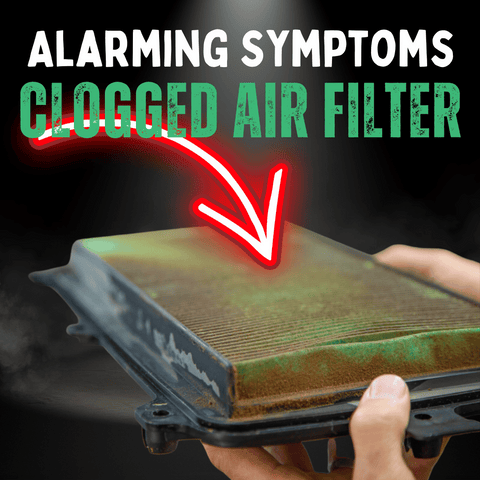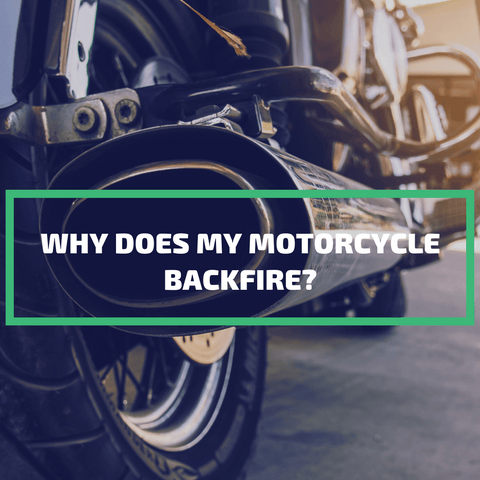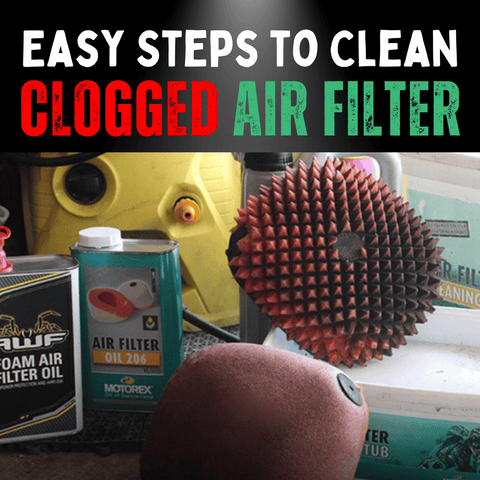
What Are the Signs of a Dirty Engine Air Filter?
Disclaimer: This article is intended for informational purposes only. While it aims to provide accurate and up-to-date information, it should not be used as a replacement for professional advice or expertise. Always consult with a trained mechanic or professional if you are unsure about any steps or procedures. Performing maintenance on your motorcycle can pose risks if done incorrectly. The author and publisher of this article are not responsible for any damages, injuries, or losses that may result from the use of the information provided. Please exercise caution and use your judgement when maintaining your motorcycle. Always follow the manufacturer's instructions and guidelines.
Are you experiencing reduced power, odd noises, or decreased fuel economy from your motorcycle?
It could be due to a factor often overlooked - the engine air filter.
This small but significant component greatly affects your motorcycle's health and performance.
Want to know more? Our guide on maintenance and repairs provides a detailed overview. 
By identifying the signs of a dirty air filter, you can keep your engine running smoothly, maximise fuel efficiency, and avoid larger issues.
This guide will help you spot those signs and provide practical solutions, empowering you to keep your motorcycle at peak performance.
Understanding the Role of an Engine Air Filter
The engine air filter plays a crucial part in the overall performance of your motorcycle.
It screens out dirt, dust, and debris from the air that is sucked into the engine for combustion.
A clean air filter ensures optimal airflow, which results in efficient combustion, thus maintaining the engine's overall health.
The Telltale Signs of a Dirty Engine Air Filter
Misfiring Engine
A misfiring engine can be a telltale sign of a clogged air filter.
When the filter is dirty, it restricts the airflow to the engine, causing unburnt fuel to exit as soot residue.
This residue can gather on the spark plug, preventing it from delivering the necessary spark to ignite the air-fuel mixture.
The result?
A misfiring or rough-jerking engine.
Related: Why Does My Motorcycle Backfire?
Unusual Noises
A dirty air filter can also create some bizarre sounds. With insufficient airflow, you might hear popping or hissing noises coming from the engine.
If your motorcycle sounds more like a sizzling breakfast than a smooth ride, it might be time to check the air filter.
Reduced Fuel Economy
Ever noticed your motorcycle drinking up more fuel than usual? A restricted air supply due to a dirty air filter might be the culprit.
With insufficient air, the engine has to work overtime, which means more fuel consumption and a dent in your fuel economy.
Poor Acceleration
A dirty air filter can be a real drag, literally! A less-than-efficient air supply to the engine can lead to poor acceleration.
If your motorcycle seems sluggish or reluctant while accelerating, you might want to have a look at the engine air filter.
Illuminated Check Engine Light
A dirty air filter can cause the check engine light to illuminate. This is due to the engine running poorly because of the restricted air supply, leading to the production of harmful emissions that can trigger the light.
If your check engine light is glowing, it might be signalling a clogged air filter.
Related: 10 Alarming Symptoms of a Clogged Air Filter: DON'T IGNORE THESE!

Visible Dirt and Debris
One of the most glaring signs of a dirty engine air filter is the filter itself.
A visibly dirty air filter, one that appears darker in colour and has inner layers of filter paper filled with dust and debris, is a clear call for immediate replacement.
Related: What Happens if an Air Filter Gets Wet?
The Importance of Regular Air Filter Maintenance
To avoid these issues, it's crucial to inspect and replace your motorcycle's air filter regularly.
Remember, a clean air filter means a happy and healthy engine.
So next time when your motorcycle seems out of sorts, check the air filter.
It might just need a quick clean or even a replacement.
Regular air filter maintenance helps ensure optimal airflow to your engine, enhancing its performance and efficiency.
It also extends the engine's lifespan by preventing harmful debris from entering and causing damage.
Inspect your air filter at least once every year or every 15,000 to 30,000 miles, depending on your motorcycle's make and model. However, if you frequently ride in dusty or polluted environments, consider inspecting it more often.
Related: GAME-CHANGING Motorcycle Hacks You NEED to Know
How to Clean or Replace a Dirty Engine Air Filter
In case you identify your engine air filter as dirty, here are some simple steps you can follow to clean or replace it.
Cleaning the Air Filter:
- Remove the air filter: First, you'll need to open the air filter box and remove the air filter. Make sure to consult your motorcycle's manual for specific instructions.
- Clean the air filter: You can clean the filter using a cleaning solution. Submerge the filter in the solution and let it soak for about 10 minutes.
- Dry the air filter: Once the filter has soaked, let it air dry completely before reinstalling it.
Related: 5 Easy Steps to Clean Your Clogged Air Filter
Replacing the Air Filter:
If the air filter is too dirty or damaged, it's best to replace it.
Here's how:
- Purchase a new air filter: Ensure you get the correct size and type for your motorcycle.
- Remove the old air filter: Open the air filter box and remove the old filter.
- Install the new air filter: Place the new filter in the box, ensuring it fits snugly and correctly.
Remember, a clean air filter is key to maintaining a smooth-running and efficient motorcycle engine.
So, make sure you keep it clean and replace it when necessary.
Please note: Not all engine air filters are meant to be cleaned. Some are disposable, in which case, you'll need to replace them when they get dirty.
Always refer to your motorcycle's manual for specific instructions regarding your air filter.
In Summary
Recognising the signs of a dirty engine air filter is a simple yet effective way to keep your motorcycle performing optimally.
An air filter that's clogged with dirt can lead to an array of problems, from a misfiring engine, unusual engine noises, and reduced fuel economy, poor acceleration, and even a glaring check engine light.
Visually, a dirty air filter is darker in colour and filled with debris.
We also learnt that you can take actionable steps to clean or replace your air filter, ensuring the engine's health and performance.
Always refer to your motorcycle's manual for specific instructions and remember, a clean air filter translates to a smoothly running engine and a more enjoyable ride.
Keep this guide handy, and your motorcycle will thank you for it!
FAQs
Is there a performance difference between paper and reusable air filters?
Reusable air filters, typically made of cotton, are often marketed as performance-enhancing due to their high airflow. However, while they can be cleaned and reused, they may not filter out small particulates as effectively as paper filters. Paper filters, though disposable, are typically more efficient at trapping smaller debris and dust particles.
Can I ride my motorcycle without an air filter?
While it's physically possible, riding without an air filter isn't recommended. The air filter protects your engine from harmful debris and particulates. Riding without one could lead to these particles entering the engine, causing significant damage over time. Always ensure your motorcycle has a clean, functioning air filter.
Can a dirty air filter cause my motorcycle to overheat?
Yes, it can. A dirty air filter restricts the amount of air that gets into the engine, causing it to work harder. This increased strain can lead to overheating, especially in high-demand situations like when you're riding at high speeds or climbing steep inclines.



